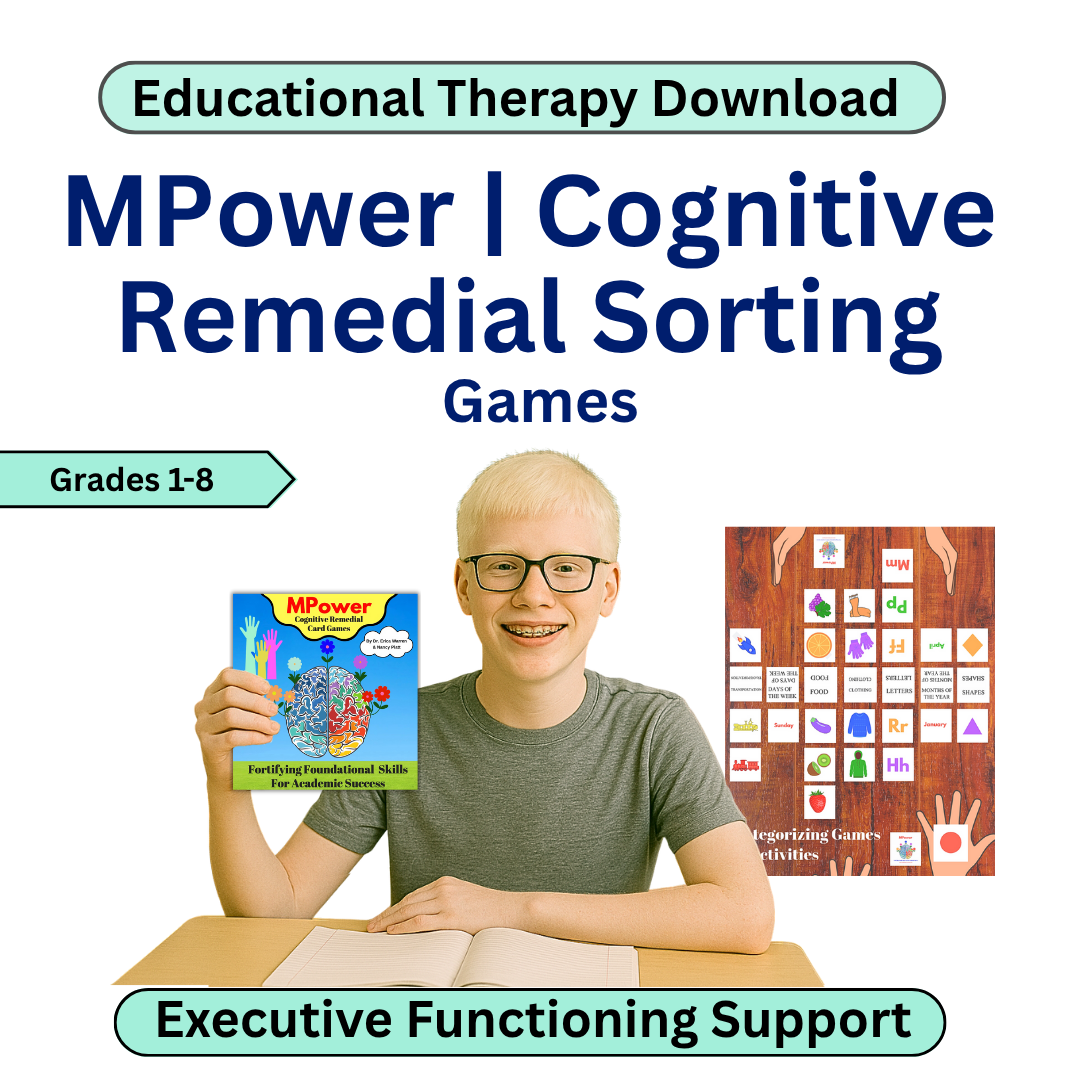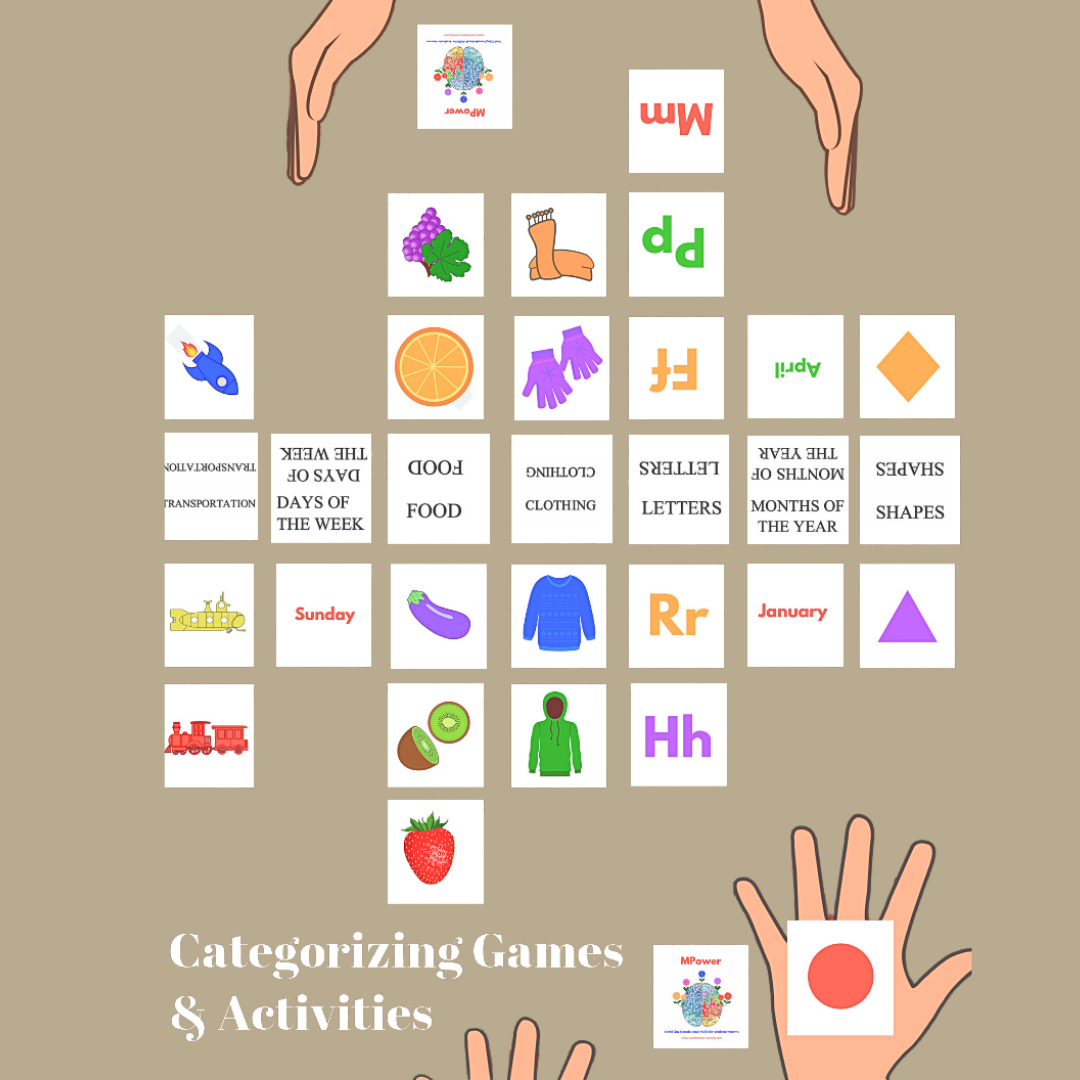The MPower downloadable publication is a comprehensive cognitive training resource, featuring two PDF documents:
- MPower Manual and Instructions 2019
- MPower Cognitive Remedial Cards 2019
This resource is akin to having a personal trainer for the brain. Just as physical exercise strengthens specific muscle groups, the MPower games are designed to build new neural pathways and enhance cognitive functions critical for academic success.
Engaging Cognitive Exercises
The games included in this publication target foundational academic skills through active engagement with key symbols and concepts, making them directly applicable to early literacy and learning. Regular practice with these games is proven to significantly boost core academic skills by enhancing recognition and naming abilities in the following areas:
- Letters
- Numbers
- Days of the Week
- Months of the Year
- Shapes
- Common Objects
Comprehensive Cognitive Development
Participants will strengthen several cognitive domains necessary for effective learning, including:
- Visual Processing: Improving the ability to understand and interpret visual information.
- Auditory Processing: Enhancing the comprehension of spoken information.
- Sequential Processing: Boosting the ability to understand and recall sequences of information.
- Simultaneous Processing: Developing the skills to categorize and synthesize material efficiently.
- Memory Skills: Including immediate visual memory, short-term memory, and working memory—key for retaining and manipulating information.
- Attention and Executive Functioning: Focusing on sustained attention, task-switching, planning, and organization.
- Attention to Detail: Cultivating the ability to perceive and evaluate detailed information accurately.
- Rapid Automatic Naming (RAN)/Word Finding/Word Recall: Speeding up the ability to recall words quickly and accurately.
- Visual-Spatial Skills: Enhancing the ability to understand spatial relationships and manipulate shapes.
Ideal for a Broad Audience
MPower is a versatile tool beneficial for therapists, educators, and parents alike, designed to facilitate cognitive development and support the educational growth of students and clients. Whether used in a therapeutic setting or at home, MPower offers effective strategies for building a stronger cognitive foundation, essential for academic achievement and everyday problem-solving.
The Research Behind MPower and the Cognitive Benefits
How Does Information Get Processed?
In the late 1960s, an information processing model was created to describe how the brain processes information. The original researchers defined four main stages: Sensory Input, Sensory Memory, Working Memory, and Long-term Memory (Atkinson & Shiffrin, 1968). Since then, many researchers have made additions to this concept, but the basic model still remains unchanged.

As reflected in the image above, learners are first presented with Sensory Input or incoming sensory information. The Sensory Memory then filters the content by selecting the most important information and passing it on to the Working Memory. Subsequently, Working Memory, which generally holds between five and nine items (or chunks) of information, either processes and encodes this information into Long-term Memory or discards it. When deposited in Long-term Memory, knowledge is filed into chunks called "schemas." A schema is a set of linked mental representations of the world that helps organize and interpret information. For example, the brain has schemas for different main ideas, such as transportation, food, and clothing, or math concepts, and phonics.
This process is key to another piece of the puzzle known as the Cognitive Load Theory (Sweller, 88). John Sweller proposed that learning is impacted by limited capacity in working memory. Sweller defined three types of cognitive load: intrinsic, extraneous, and germane. Intrinsic load has to do with the inherent difficulty of the subject matter or information being input. It is influenced by the complexity of the lesson and how much prior knowledge a student has about the subject. Extraneous load refers to the manner in which information is presented to learners as well as the teaching style, lesson materials, and the learning environment. Germane load is the productive thinking that causes students to form and consolidate long-term memories. Sweller suggested that since working memory has a limited capacity, instructional methods should avoid overloading it. A sense of “cognitive overload” occurs when working memory capacity is exceeded. Once this happens, students are unlikely to comprehend the information and transfer it to long-term memory (Siegler & Alibali, 2015; Sweller, 1988; Sweller, Merriënboer, & Paas, 2019).
The image above shows the importance of maintaining a balance between cognitive load (intrinsic load, extraneous load, and germane load) and cognitive capacity (working memory capacity and long-term memory capacity).
Four Factors that Increase Cognitive Load.
- Learners lack intrinsic load capacity or general knowledge.
- Learners’ approach to learning is labored and has not reached a level of automatization.
- Teachers’ presentation of the lesson is too dull or too complex.
- Learners do not possess the cognitive techniques that can help them manage the Germane load or productive thinking with the content.

MPower Helps Balance Cognitive Load and Capacity
MPower was designed to help learners create the necessary balance between cognitive load and cognitive capacity. The card games provide exposure to early literacy concepts such as letters, numbers, shapes, months of the year, and days of the week. In addition, MPower integrates multisensory and playful content into lessons, which makes the learning process more enticing and engaging. Repeated play helps to develop skills to a level of automatization. In other words, over time, the player’s abilities improve until they can access and process the information with little to no effort. When this sense of automatization is reached, it creates more cognitive space, or working memory learning. Finally, MPower can help struggling students or clients increase their ability to manage germane cognitive load. Recent research suggests that segmenting and sequencing techniques can help learners manage content that might otherwise create cognitive overwhelm (Sweller, Merriënboer, & Paas, 2019). In other words, MPower teaches the brain how to quickly organize information during the encoding process, so recall is enhanced.
Who Benefits from MPower?
This publication was created for learners of all ages and abilities:
- Preschoolers who need to develop cognition and basic core academic skills.
- Children with learning disabilities exhibit difficulties learning academic content.
- Head-injured victims who need to rebuild cognition.
- Elderly people who want to maintain or rebuild cognition.
Specifically, MPower aids those who are exhibiting one or more of the following difficulties:
- Many learners don’t have the core cognitive skills to manage their learning. (Savage, 2005; Passolunghi & Seigel, 2001; Gunnison, Kaufman & Kaufman, 1982; Das, Mensink, 1989; Chu, Vanmarie & Geary, 2016; Bull, Johnston, 1997). Poor exposure and/or weaknesses in basic cognitive processing areas can make schoolwork an overwhelming chore.
- Many learners have come to dislike the learning process altogether. Traumatic learning experiences and negative associations with schoolwork often result in a sense of learned helplessness, and many of these learners will do whatever they can to avoid activities that exercise cognition (Fincham, Hokoda, & Sanders, 1989, 02; Diener & Dweck, 1978; Valås, 2001, 03).
Clearly, developing core cognitive skills and making the learning process fun and engaging is key. This publication was created for my clientele and others like them to build competencies and to rekindle a joy for learning by presenting the lessons and exercises as fun activities and games.



